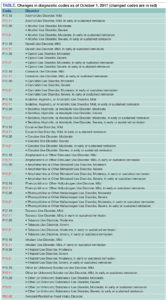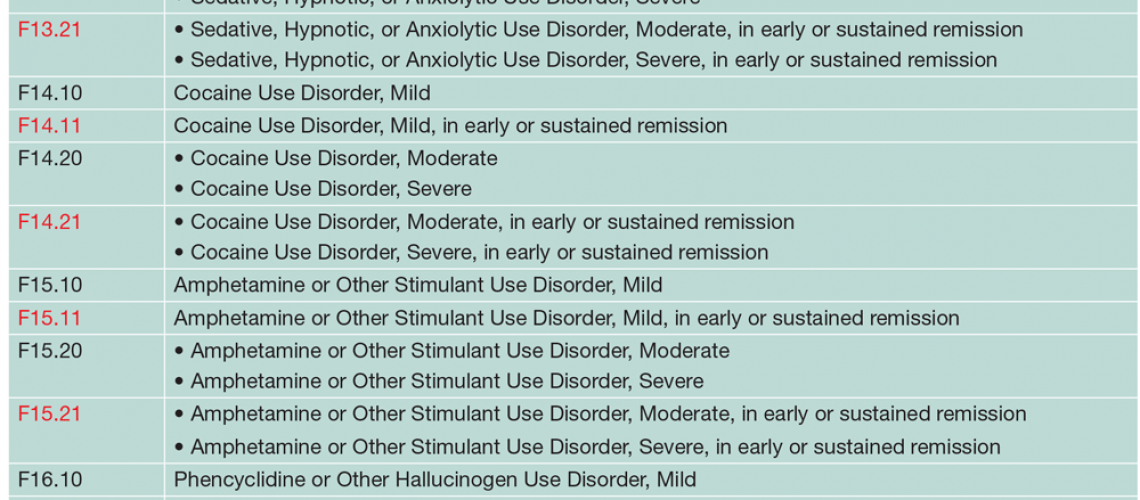Once a year, the National Center for Health Statistics (NCHS), the federal agency responsible for the use of the International Classification of Diseases – 10th revision (ICD-10) in the US, releases an updated version of the ICD-10-CM, the HIPAA-adopted code set for medical diagnoses used by medical providers, insurers, and health care administrators. The 2018 update of the ICD-10-CM took effect on October 1, 2017, meaning that users of the ICD-10-CM are required to start using the updated codes as of that date.
Coding updates affect the ICD-10-CM codes across all areas in medicine and typically are made to improve coding specificity. For example, the diagnostic code for Type 2 Diabetes Mellitus with Ketoacidosis (E11.1) has been altered to allow the clinician to indicate whether the ketoacidosis was accompanied by coma. This year, there are several coding updates that affect the diagnostic coding in the Mental, Behavioral, and Neurodevelopmental chapter (F00-F99) and thus affect the diagnostic codes used by mental health practitioners. As is the case with most of the other coding updates, the changes to the mental disorder codes aim to improve the coding specificity of the diagnoses, which in turn can help optimize medical reimbursement.
 One important update involves the diagnostic codes for substance use disorders. The ICD-10-CM diagnostic codes recommended by DSM-5 are F1x.10 for the diagnosis of mild substance use disorder, and F1x.20 for both moderate substance use disorder and severe substance use disorder, where x indicates the class of substance: 0 for alcohol use disorder; 1 for opioid use disorder; 2 for cannabis use disorder; 3 for sedative, hypnotic, or anxiolytic use disorder; 4 for cocaine use disorder; 5 for amphetamine or other stimulant use disorder; 6 for phencyclidine or other hallucinogen use disorder; 7 for tobacco use disorder; 8 for inhalant use disorder; and 9 for other or unknown substance use disorder. Currently, the clinician indicates that the substance use disorder is in early or sustained remission either by writing in the applicable specifier on the chart or by selecting it from a drop-down menu on an electronic health record. Either way, the fact that the substance use disorder is in remission is not reflected in the diagnostic code. For example, mild alcohol use disorder and mild alcohol use disorder in sustained remission have the same diagnostic code: F10.10.
One important update involves the diagnostic codes for substance use disorders. The ICD-10-CM diagnostic codes recommended by DSM-5 are F1x.10 for the diagnosis of mild substance use disorder, and F1x.20 for both moderate substance use disorder and severe substance use disorder, where x indicates the class of substance: 0 for alcohol use disorder; 1 for opioid use disorder; 2 for cannabis use disorder; 3 for sedative, hypnotic, or anxiolytic use disorder; 4 for cocaine use disorder; 5 for amphetamine or other stimulant use disorder; 6 for phencyclidine or other hallucinogen use disorder; 7 for tobacco use disorder; 8 for inhalant use disorder; and 9 for other or unknown substance use disorder. Currently, the clinician indicates that the substance use disorder is in early or sustained remission either by writing in the applicable specifier on the chart or by selecting it from a drop-down menu on an electronic health record. Either way, the fact that the substance use disorder is in remission is not reflected in the diagnostic code. For example, mild alcohol use disorder and mild alcohol use disorder in sustained remission have the same diagnostic code: F10.10.
The October 1 update remedies this by providing different ICD-10-CM codes for active substance use disorder and substance use disorder in remission. Whereas mild substance use disorder continues to be F1x.10, moderate substance use disorder continues to be F1x.20, and severe substance use disorder continues to be F1x.20, mild substance use disorder in remission is now coded as F1x.11 and moderate and severe substance use disorder in remission is now coded as F1x.21 (Table).
The other coding update effective October 1, 2017, involves the ICD-10-CM code for avoidant/restrictive food intake disorder (ARFID). It is now changed from F50.89 (a diagnostic code which is shared by other specified eating or feeding disorder) to F50.82, which will be unique to ARFID.
——————————————————
Photo courtesy of: Psychiatric Times
Originally Published On: Psychiatric Times
Follow Medical Coding Pro on Twitter: www.Twitter.com/CodingPro1
Like Us On Facebook: www.Facebook.com/MedicalCodingPro







